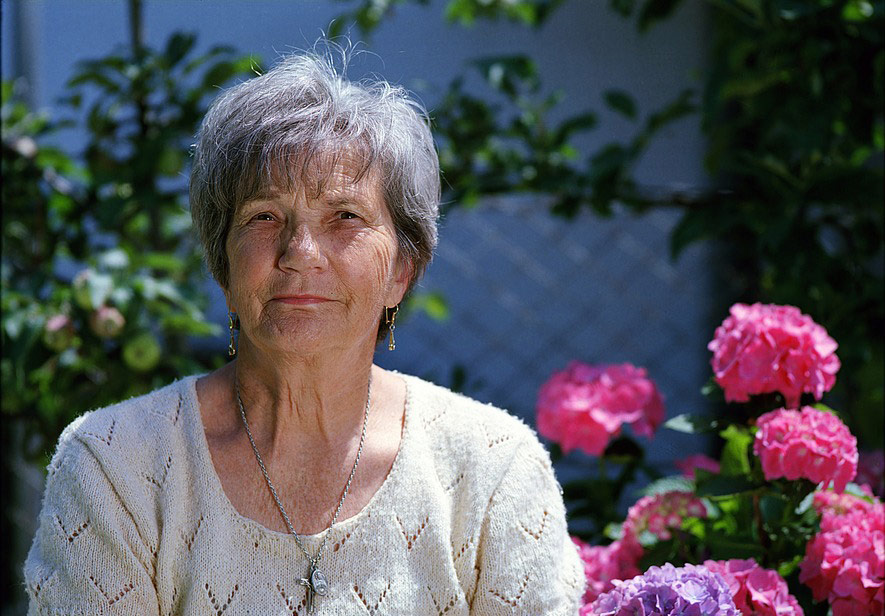Elderly veterans often face growing health concerns and challenges as they age. Because of this, the Department of Veterans Affairs (VA) provides several programs and benefits targeted towards meeting the unique healthcare needs of veterans over the age of 65.
9 Helpful Benefits for Elderly Veterans
- VA Aid and Attendance
- Housebound
- Geriatrics Research
- Geriatrics Program
- Long Term Care
- Eligibility for Long Term Care
- Nursing Homes
- Residential Care
- Home Based and Community Services
2018 Census data reports that the median age of veterans in the United States is 65, meaning that most U.S. veterans qualify as seniors.
In addition to the numerous and varied services that all military service members are entitled to during their time in and after leaving the armed forces, these older veterans are eligible for additional benefits offered by the Department of Veterans Affairs.
Such benefits for elderly veterans include both financial support for aging veterans along with their families and special healthcare programs tailored for elderly veterans’ specific needs.
1. VA Aid and Attendance
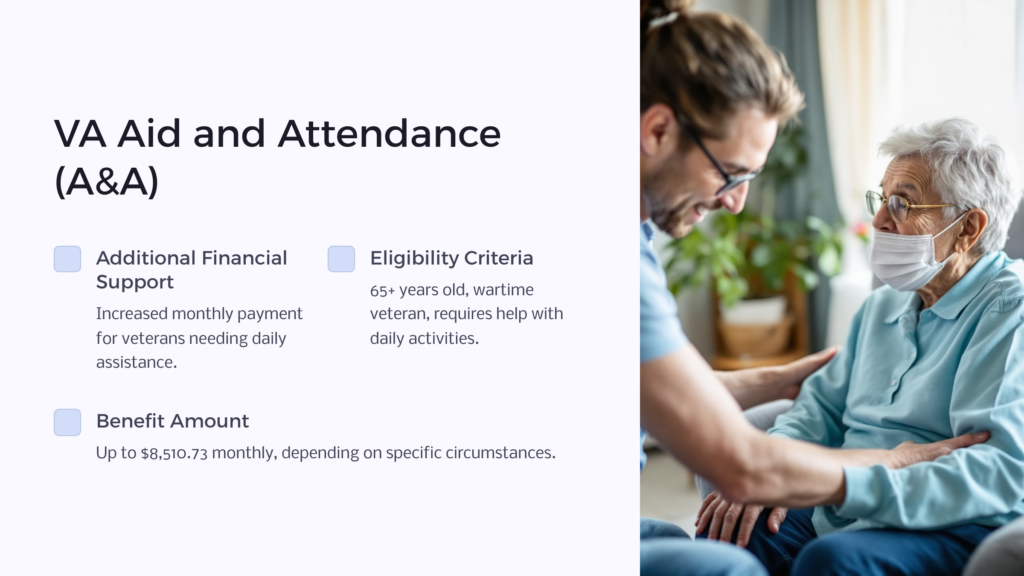
If you receive a veteran’s pension benefit already, you may be entitled to an increased payment each month through the VA Aid and Attendance (A&A) benefit.
This benefit is offered by the Department of Veterans Affairs under the Special Monthly Compensation program as an additional cash amount on top of the monetary assistance already sent out to an eligible senior veteran.
The Aid & Attendance benefit may be received even if a veteran is already being given veterans benefits such as VA disability benefits every month.
Aid & Attendance benefits were created for aging veterans facing debilitating health challenges. The program provides additional financial assistance to elderly veterans who struggle with day-to-day life and require assistance in some form, whether that is from a spouse or medical caregiver.
For this reason, veterans must meet numerous certain criteria to be eligible for A&A payments. Firstly, a qualifying veteran must be 65 years of age or older (except for a few, case-by-case exceptions if the veteran is entirely disabled) and must be a wartime veteran with a history of active duty.
Senior veterans eligible for Aid and Attendance benefits also meet at least one of the following circumstances:
- Need assistance with daily activities, such as eating, getting dressed, and/or bathing
- Are bedridden due to an ailment, injury, or illness
- Are a nursing home patient
- Have very limited eye vision or blindness
The dollar amount that eligible veterans may be offered by the Aid and Assistance benefit varies depending on factors involved in his or her specific case.
As of 2018, veterans receiving A&A who required daily assistance from a caregiver, but not a medical professional, were given up to $7,419.88 each month, and veterans who need help from an in-home medical caregiver to live day-to-day were offered up to $8,510.73.
2. Housebound
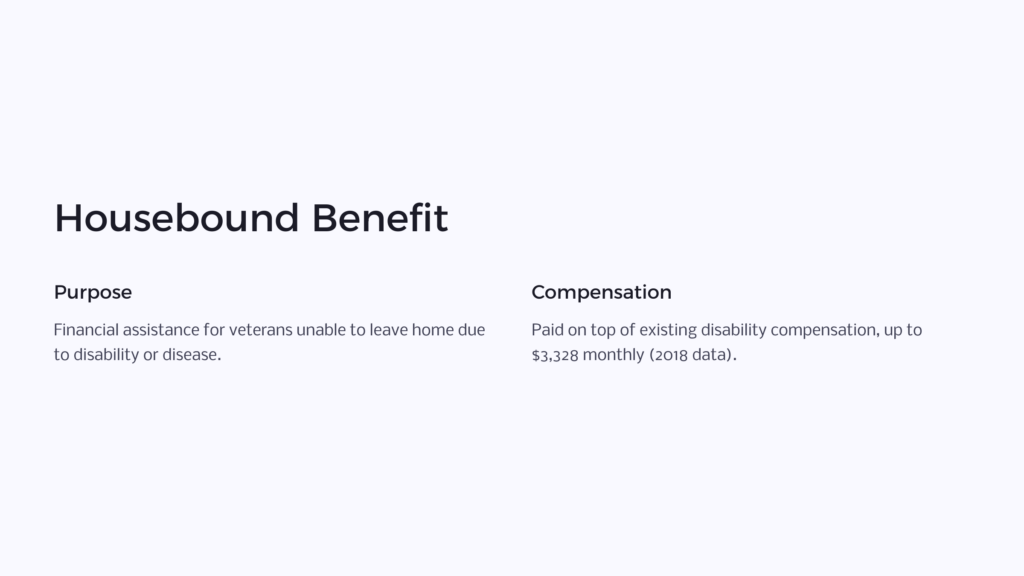
Another form of financial assistance that the Department of Veterans Affairs provides to ailing elderly veterans is the housebound benefit. As its name suggests, housebound is given to aging veterans who cannot leave home due to disease or a permanent disability.
The compensation is paid on top of any existing disability compensation. Per 2018 data, veterans eligible for receiving the housebound benefit were offered up to $3,328 monthly.
3. Geriatrics Research

In 1975, Congress formed Geriatric Research, Education, and Clinical Centers (GRECCs) underneath the Veterans Health Administration to research aging, and particularly how growing older affects veterans’ health.
These centers, which are spread across 20 U.S. locations, are committed to gaining knowledge on geriatrics through scientific research and using the information gathered from such research to improve elderly veteran healthcare.
GRECCs serve the elderly veteran community through the continuous development of clinical programs, which are adopted by hospitals where elderly veterans are treated across the nation.
4. Geriatrics Program
The Department of Veterans Affairs offers many services to elderly veterans through their Geriatrics program, which focuses on delivering up-to-date healthcare to aging veterans. These services include programs such as Long Term Care, Home Based and Community Services, and Nursing Home and Residential Care.
5. Long Term Care
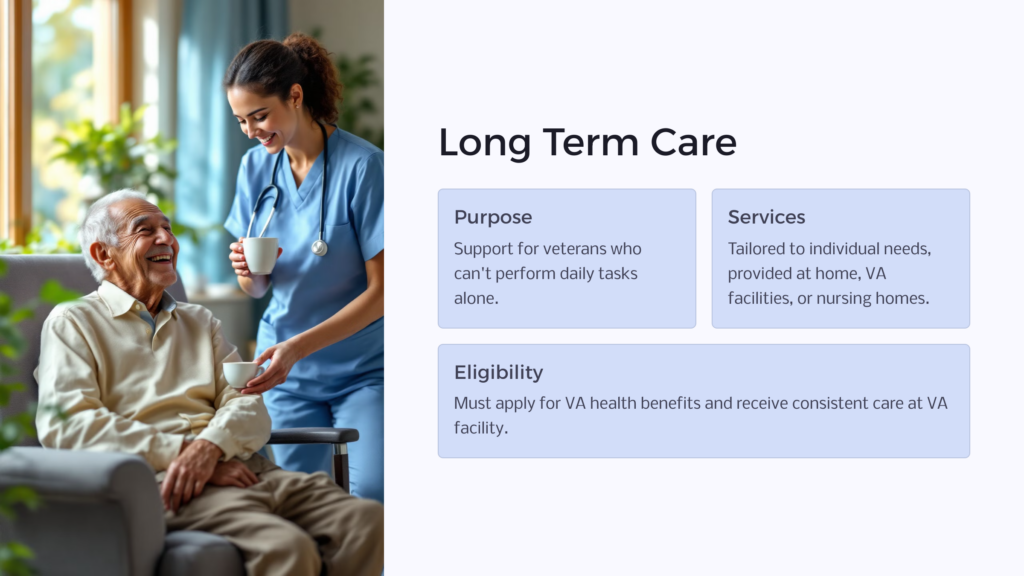
VA Long Term Care is a healthcare program open to all veterans who require everyday assistance.
The program was developed to provide support to veterans suffering a critical injury or illness who can not perform daily tasks alone and includes a wide array of services tailored to a veteran’s individual needs. Elderly veterans may be treated under a Long Term Care program at home, at a VA medical facility, or in a nursing home.
6. Eligibility for Long Term Care
To be eligible for Long Term Care, veterans must first apply for VA health benefits and obtain care at a VA facility on a consistent basis.
Factors like age, health status, and military service history determine who qualifies for elderly veterans benefits through the Department of Veterans Affairs. Once a veteran is enrolled in VA health care, their standard medical benefits package includes all Services at Home and in the Community services, including a geriatric evaluation to determine individual healthcare needs and develop a custom care plan.
Other benefits in the package that a veteran enrolled in VA health care may receive include Adult Day Health Care, Skilled Home Health Care, Respite Care, and more. To receive a service underneath VA health care benefits, you must demonstrate a need for it, and it must be available in your local area.
Eligibility to receive Nursing Home and Residential Care services differ on a case-by-case basis. Only elderly veterans who meet specific criteria may be eligible to receive nursing home or residential care through VA benefits.
7. Nursing Homes
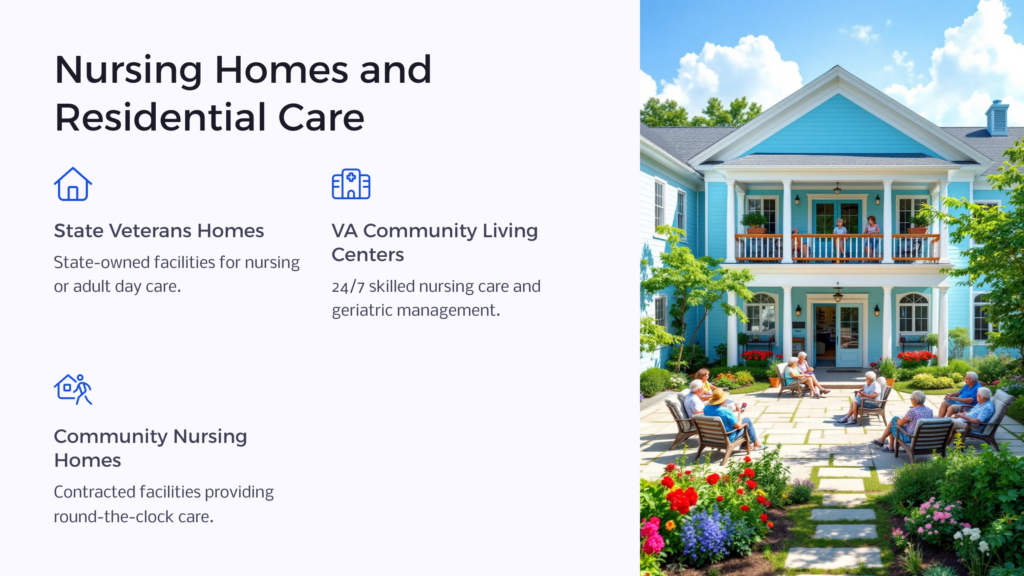
Nursing Home services provided for eligible veterans through the Department of Veterans Affairs include:
State Veterans Homes
State government-owned facilities serve as nursing homes or adult day care centers for elderly veterans. These veterans homes are not managed by VA but may receive funding from it to offset the medical expenses for veterans. Eligibility and costs vary by state.
VA Community Living Centers (CLC)
VA Community Living Centers are nursing homes with 24/7 skilled nursing care, geriatric management, restorative care, and more services for veterans. Medical need and availability in a veteran’s area determine who qualifies for the community living center benefit.
Community Nursing Homes
These nursing homes have contracts with the Department of Veteran Affairs to give veterans a place to live and receive care around the clock. The VA may pay for Community Nursing Home care if a veteran meets disability, countable income, and service requirements.
8. Residential Care

Available VA Residential Care services include:
Medical Foster Homes
These are private homes with skilled nursing professionals that provide 24/7 assistance to a few individuals. An elderly veteran may choose to reside in a medical foster home instead of a nursing home if they prefer a more homely setting with just a few other residents, however it costs between $1500-3000 per month and is not paid for by VA. To be eligible for a Medical Foster Home, one must be enrolled in Home Based Primary Care, and a foster home must be available.
Assisted Living
Veterans may rent a room (not paid for by VA) at an assisted living facility where a caregiver is available 24 hours a day. VA may provide for additional healthcare given by a trained medical professional who visits the veteran. Clinical need and local availability decide who qualifies for VA benefits for assisted living.
Adult Family Homes
Like Medical Foster Homes, Adult Family Homes are private homes with a few residents where a caregiver is present around the clock to assist. Rent in an Adult Family Home is not paid for by Veterans Affairs, however, the VA may pay for a medical professional to visit the home to provide additional care to an eligible veteran. Eligibility is based on need and availability in a veteran’s area.
Community Residential Care (CRC)
Community Residential Care is a program for elderly veterans who cannot live alone because of medical or psychiatric conditions but do not require professional medical assistance day-to-day. CRC gives veterans room, board, and limited personal care at one of over 550 locations in the United States, which can be chosen by the veteran.
Traumatic Brain Injury Residential Rehab (TBI-RR)
TBI-RR is a program for veterans who have suffered a brain injury and require treatment that cannot be fully met at an outpatient facility or nursing home. VA pays for services provided at TBI-RR, but veterans must pay for room and board, which is $30-40 per day.
9. Home Based and Community Services
The Department of Veterans Affairs offers Home Based and Community Services to deserving elderly veterans, such as:
Hospice Care
Hospice Care provides comfort services to elderly veterans and their families when the veteran has a terminal illness with less than 6 months to live. This care may be extended to a surviving spouse of a deceased veteran shortly after their passing, as well. All veterans enrolled in VA health benefits who meet this condition are eligible.
Adult Day Health Care
This is a program for veterans who either need help living day-to-day or are isolated where care and recreation activities are provided during the daytime. Elderly veterans enrolled in VA health benefits who demonstrate clinical need are eligible.
Remote Monitoring Care
Remote Monitoring Care is a service where an elderly veteran’s doctor or nurse uses monitoring equipment to keep watch over a veteran’s health condition while they are at home.
Home Based Primary Care
This program provides healthcare to elderly veterans living at home. Home Based Primary Care is for veterans who are battling an ongoing illness or disability in which they require routine care but have difficulty visiting a clinic for treatment. All veterans enrolled in VA healthcare who show a need for the service are eligible.
Homemaker & Home Aide Care
This care program is for elderly veterans who require help with daily activities. A trained individual visits the veteran’s home to give care. A homemaker or home aide may provide services such as assisting the veteran with eating, bathing, grocery shopping, and more.
Veteran-Directed Care
This program is for senior veterans who are isolated or need daily assistance with activities like eating or bathing. The veteran is given a budget to hire caregivers to assist with independent living.
Palliative Care
These comfort services aim to provide relief and management of symptoms to help elderly veterans with an illness or disability continue to live their everyday lives. This is included in the standard VA benefits package, and all aging veterans who show a need for palliative care may receive it.
Skilled Home Health Care
Elderly veterans who require temporary care while adjusting from a hospital or nursing home back to their own home can receive care during this transition. Skilled health professionals contracted by VA provide these services to veterans who show a need for such care.
Respite Care
Respite Care allows family caregivers to have a break by paying for the care of a veteran while their family caregiver is away. Respite Care may be provided for an elderly veteran in-home by a professional caregiver or at a nursing home or adult day care center, where a veteran may temporarily visit to receive care until their family caregiver returns.
How To Apply for Elderly Veterans Benefits
Elderly veterans, their military spouse, or family member may apply for VA benefits in a variety of ways. Applications can be filled out in person at a regional Department of Veterans Affairs office, online through the VA.gov, or by working with a local VSO.
Whichever method you prefer, be sure to have documents such as your military discharge papers, annual household income, insurance information, and social security number on hand, as these are usually required to apply.
As senior veterans age, they become eligible for more veterans benefits provided by the Department of Veteran Affairs to assist them with their individual healthcare needs.
These benefits for elderly veterans include monetary assistance in the form of increased monthly payouts on top of VA pension and innovative healthcare programs developed by VA geriatrics research professionals.
If you or a loved one who served in the U.S. military would like to receive VA benefits, you may apply from the comfort of your own home online or in person at a VA office, where workers can assist you with your application.
 Benefits.com Advisors
Benefits.com Advisors
With expertise spanning local, state, and federal benefit programs, our team is dedicated to guiding individuals towards the perfect program tailored to their unique circumstances.
Rise to the top with Peak Benefits!
Join our Peak Benefits Newsletter for the latest news, resources, and offers on all things government benefits.















